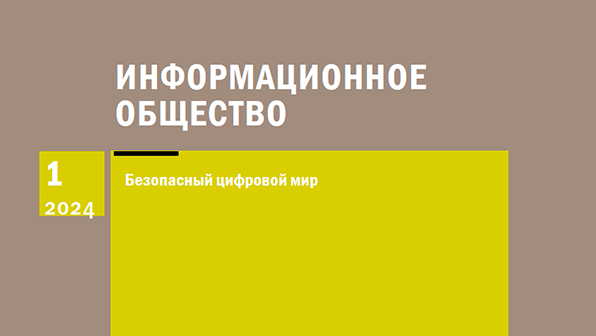The first issue of the scientific and analytical journal “Information Society” for 2024 has been published.
The main theme of the issue is Security in the digital world.
Information support for demographic security
Students in online communities
Graphic images to convey emotions
Development of intelligent electronics projects
Digital skills for Industry 4.0
Developer’s responsibility for software quality
Protection against the risks of social engineering attacks
Media framing of the Kaliningrad region
Assessing the effectiveness of scientific research
Agro 4.0 in Colombia
In her address to readers “Scientists who brought Victory closer,” the journal’s editor-in-chief Tatiana Ershova wrote:
The first issue of our journal is traditionally published at the end of February, shortly after Defender of the Fatherland Day, one of the favorite Russian holidays. In the title of my address to readers, I took a phrase from an article on the Nauka.rf portal, dedicated to the contribution of Soviet scientists to the victory in the Great Patriotic War. Since 2021, the Russian Ministry of Education and Science has been holding the All-Russian action “Scientific Regiment”. During this time, hundreds of materials were published dedicated to those “who changed their white coats for a soldier’s overcoat, put aside microscopes until better times and went where the Fatherland needed them.”
Immediately after the start of the war, the country’s leadership set the task of revising the topics and methods of research work and redirecting resources to areas of primary importance. It was decided to move 76 institutes to the East, the Presidium of the USSR Academy of Sciences moved to Kazan (Tatarstan). Many scientists and professors voluntarily went to the front to fight on the front lines, and those who remained in the rear devoted all their energy and time to the development of the technological power of the Soviet Union.
Thanks to people of science, new technologies needed by the front and rear were created in record time. Here are some examples: Boris Bezhanov, one of the founders of pneumatic automation; Boris Vasiliev, who synthesized new fuel for armored vehicles and tanks based on perfume raw materials to replace gasoline, which was in short supply at that time; employees and students of the Moscow Polytechnic University, who created materials for field military printing houses, technologies for optical instruments of military equipment; scientists of the Moscow Automechanical Institute, who were involved in the selection of substitutes for German fuels and oils for captured vehicles and the conversion of gasoline vehicles into gas generators and those running on wood fuel. During the war years, the need for the production of liquid oxygen from air sharply increased, and the outstanding physicist Pyotr Kapitsa solved this problem: in 1942 he developed a turbo-oxygen plant, which was put into operation in 1943.
The founder of the modern scientific oncology school, Nikolai Blokhin, performed more than 4,600 reconstructive operations during the war years. Organic chemist Isaac Postovsky and other employees of the Sverdlovsk Chemical Pharmaceutical Plant established the industrial production of sulfa drugs necessary for the treatment of purulent wounds and tuberculosis. During the siege of Leningrad, the State Institute of Applied Chemistry organized the production of medicines for soldiers, and chemists at the Forestry Academy produced a paste for the treatment of burns, frostbite, and gunshot wounds.
The list of outstanding achievements of Soviet scientists during the war years is enormous, it is impossible to count them all. After the war, the President of the USSR Academy of Sciences, Sergei Vavilov, noted that one of the many miscalculations that led to the failure of the fascist campaign against the USSR was the Nazis’ underestimation of Soviet science.
The editors cordially congratulate on Defender of the Fatherland Day all researchers and university teachers involved in strengthening the defense capability of our country. Today this is no less relevant than during the Great Patriotic War.
The full contents of the issue are available on the journal’s digital platform.
